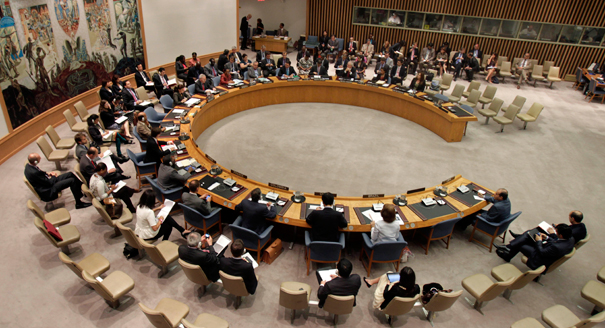
Azerbaijan Outlines Its Priorities For the UN Security Council
Publication: Eurasia Daily Monitor Volume: 8 Issue: 209
By:

Azerbaijan’s October 24 election as a non-permanent member of the UN Security Council continues to remain an important headline both within the country and across the region. The majority of analysts agree that this will strengthen the country’s international standing and image, while empowering it to pursue an even more proactive diplomatic agenda around the world. Sabina Freiser, the Director of the International Crisis Group’s European programs stated in Baku on November 4 that “Azerbaijan’s election will not only contribute to the resolution of the Karabakh conflict, but will also strengthen the international image of the country” (www.1news.az). Russian political scientist Vasiliy Koltashov, the head of the center for economic research at the Institute of Globalization and Social Movements, stated “Azerbaijan’s membership of the UN Security Council opens new opportunities for the country to raise issues of its concern” (www.1news.az, November 5).
Meanwhile, Azerbaijan’s Foreign Minister Elmar Mammadyarov during a meeting with the faculty and students of the Azerbaijan Diplomatic Academy, outlined several key areas of interest for the country during its membership of the UN Security Council: “Along with issues of immediate national security, Azerbaijan will support the agenda of the UN Security Council in regards to international peace and stability; resolution of conflicts, climate change, poverty reduction within the Millennium Development Goals and promotion of multiculturalism” (www.day.az, October 28).
While a majority in the country expects Azerbaijan to capitalize on its seat on the UN Security Council to raise the issue of the Karabakh conflict and the occupation of Azerbaijani lands, the government is keen to focus on global issues in order to both gain more allies internationally and show Azerbaijan to be a global player. Indeed, the growing economic potential of the country allows Azerbaijan to be a global and certainly a regional player. In 2011 alone, Baku hosted several high-profile events to promote the concept of multiculturalism, tolerance and inter-religious dialogue. The international forum on inter-religious dialogue in March and the Humanitarian forum in October attracted many retired presidents and public figures from around the world and stressed the successful example of Azerbaijan as a country with many ethnic and religious groups, yet able to live in peace and harmony. Considering that one third of the votes in support of Azerbaijan came from Islamic countries, it is likely that the country will continue supporting the agenda and concerns of the Islamic world and further stress the need for inter-religious peace.
At the same time, Azerbaijan is increasingly becoming a significant player in international aid programs. As a recipient of humanitarian assistance in the past due to its large number of refugees and internally displaced persons (IDPs), Azerbaijan appreciates the role of international donor agencies and is also keen to contribute to reducing global poverty. In the past few years, the country has provided relief to the victims of various natural catastrophes in Haiti, Pakistan, Indonesia, Japan, the United States and many other countries. Azerbaijan was the first country to provide humanitarian assistance to its close partner Turkey during last month’s earthquake in Van. In 2011, Azerbaijan established an International Development Agency and started providing educational scholarships to students from some 16 countries. Such acts truly show the growing capacity of Azerbaijan and further highlight the positive contribution that this small nation can make to international development.
Azerbaijan will remain committed to international peacekeeping and conflict resolution efforts. It is already a major player in peacekeeping operations in Afghanistan and, in the past, in Iraq and Kosovo. Supporting such efforts as well as further seeking international sympathy for the peaceful and just resolution of the Karabakh conflict will top the agenda of Azerbaijan’s diplomacy.
Pursuing and supporting efforts to combat climate change is a way for Azerbaijan to help thank small Pacific and Caribbean nations for their support during the election of the country to the UN Security Council. In that election, Azerbaijan received 155 votes, many of which came from these highly endangered areas. Azerbaijan has already established a national agency for alternative energy and has built its first wind-turbine zone to promote renewable energy.
Azerbaijan is preparing to join the elite diplomatic club and even chair it twice during its membership. The country is taking this international duty quite seriously. The permanent representative of Azerbaijan to the UN, Ambassador Agshin Mehdiyev, stated: “Countries, electing a member of the UN Security Council, express their trust in it and give certain responsibilities for the resolution of international problems” (www.1news.az, November 5). The country’s political leadership and diplomatic corps is keen not to fail to meet these expectations.




